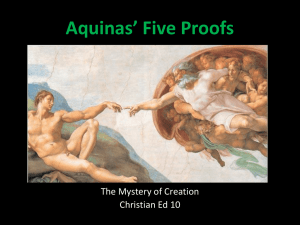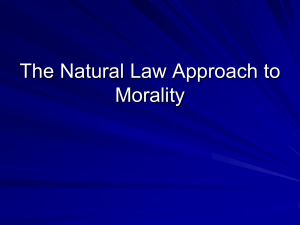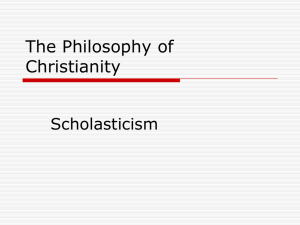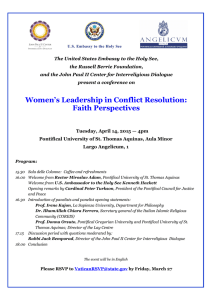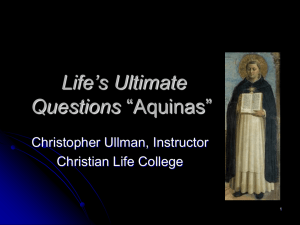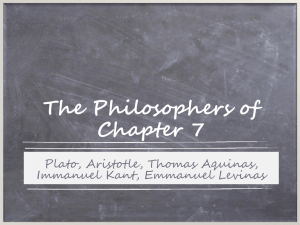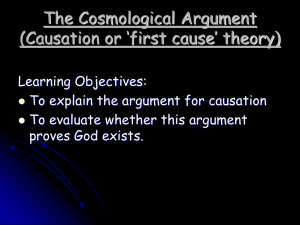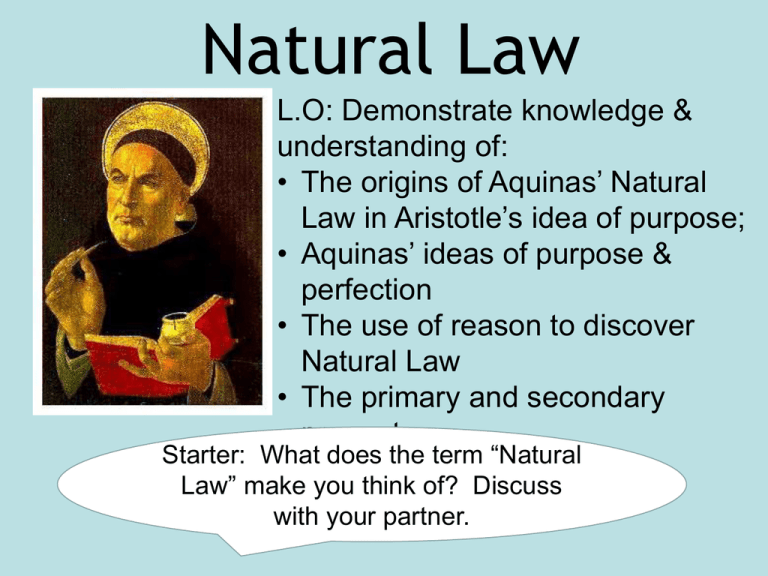
Natural Law
L.O: Demonstrate knowledge &
understanding of:
• The origins of Aquinas’ Natural
Law in Aristotle’s idea of purpose;
• Aquinas’ ideas of purpose &
perfection
• The use of reason to discover
Natural Law
• The primary and secondary
precepts
Starter: What does the term “Natural
Law” make you think of? Discuss
with your partner.
Recap: What is natural law?
• http://www.youtube.com/watch?v=9IQqKH
VhJ0g
• http://www.youtube.com/watch?v=kqtsExn
YeFI
• http://www.youtube.com/watch?v=fMiH4Dx4a4
Features of Natural Law
Natural Law is deontological – concerned with inherent worth of
the action.
Natural Law is absolute – it does not allow any exceptions to it’s
rule and can be applied universally.
Aristotle
350BCE
Cicero
106-43BCE
Aquinas
1225-1274 CE
Law has it’s roots in ancient
Greece and later, the thinking
of the Stoics. They believed
God was everywhere and in
everyone. Humans have within
them a ‘divine spark’ which
helps them to find out how to
live according to the will of
God.
Note – ‘god’
is not a
traditional
Judeo
Christian
understanding of God
look at the
dates!
‘True law is right reason in agreement with
Nature...it is of universal application, unchanging
and everlasting... we need not look outside
ourselves for an expounder or interpreter of it. And
there will not be different laws at Rome and at
Athens, or different laws now and in the future, but
one eternal and unchangeable law will be valid for
all nations and for all times, and there will be one
master and one ruler, that is, God, over us all, for
He is the author of this law, its promulgator, and its
enforcing judge. Whoever is disobedient is fleeing
from himself and denying his human nature, and by
reason of this very fact he will suffer the worst
penalties, even if he escapes what is commonly
considered punishment.’
The beliefs of the Aristotle and the Stoics are the foundation
of natural law as develop by St Thomas Aquinas.
Thomas Aquinas
St Thomas Aquinas is the main exponent of Natural law. He is
one of the most influential theologians in the history of the
Catholic Church.
His thinking is the basis of many teachings of the Catholic
Church – these are based on his belief in the natural law.
Much of Aquinas’ thinking is based on the thinking of Aristotle.
Aristotle is an ancient Greek philosopher writing in
approximately 350 BCE. Aquinas wrote his most famous works
‘Summa Theologica’ from1265 -1274.
ARISTOTLE
Aristotle was an ancient Greek philosopher
writing in approximately 350 BCE. His ethical
theory is called VIRTUE theory. Virtues are
desirable qualities of character. His theory
focused on people’s character rather than
their actions. He believed that in order to be
a good person we should aim to posses certain
virtues and avoid certain vices (bad qualities
of character). He believed that if we did this
we this we would flourish as humans and be
all we can be. He said that it was the aim of
human beings to be happy, the word in Greek
is ‘Eudaimonia’. This happiness is not to be
likened to pleasure or success but instead the
happiness attained by living a virtuous life.
Aristotle believed that a soul was what gave a living thing life.
He concluded that there were three types of soul. The soul of
plants is a VEGETATIVE soul that is only capable of growth and
reproduction. The soul of animals is a SENSITIVE soul which is
capable of growth, reproduction and movement. However the
soul of human beings is a RATIONAL soul, capable of all that
animals can do but also with the ability to reason. It is the
ability to reason that separates humans form the animals.
Aristotle was an empiricist so he believed that the answers to
all things lay in this world. He believed that nature had been
organised in such a way that all things had a purpose. This is
called his belief in the CAUSES.
According to Aristotle all things had four Causes. The Material
Cause – what it is made of, the Formal Cause – The idea behind
the design of it, the Efficient Cause - how it comes to be and
the Final Cause - what it’s purpose is. By determining what
something is for (final cause or telos in Greek) one can
determine how that ‘thing’ should be used – it’s efficient cause.
He believed all things in life are caused except the first cause
of everything which he called the ‘uncaused cause’.
REASON is
a very
important
word in
ethics – it is
the
capacity for
logical,
rational,
and
analytic
thought.
NOT for
example
the REASON
I was late….
Aquinas fused his faith in God with Aristotle’s philosophy.
For example: Aristotle promoted virtues as a means to
being good e.g. courage and patience. Aquinas also
believes this but he includes Christian virtues such as
faith and charity. Aristotle believes that the ultimate aim
in life is happiness – He called this eudaimonia and
believed this was only possible by living a virtuous life
and being all you can be. In Aquinas's thought, the goal
of human existence is also happiness yet this is achieved
through union and eternal fellowship with God.
Specifically, this goal is achieved through the Beatific
Vision (visio beata) an event in which a person
experiences
perfect,
unending
happiness
by
comprehending the very essence of God. This vision,
which occurs after death, is a gift from God given to
those who have experienced salvation and redemption
through Christ while living on earth. By living in a way
according to our purpose it is possible to achieve
perfection but only in the after life.
Aristotle believes the ‘uncaused cause’ is the beginning of
everything – as does Aquinas but he calls the ‘uncaused
cause’ God.
Most importantly in this theory Aquinas uses Aristotle’s belief
in the causes to explain what is good. He believed that
everything in life serves a purpose and has an efficient and
final cause. Efficient causes are the things/processes by
which things are achieved e.g. the tools used to create a
wooden figure and the final cause is the end product e.g.
the wooden figure itself. For Aristotle, everything has a
telos or end purpose, and this determines it’s ‘good.’ If we
can understand the final cause of an organism we can
understand the necessary processes to reach this. Once the
correct process for something has been determined this is
the morally right thing to do as this is what has been
naturally intended.
Therefore central to Aquinas’ thought is the ‘telos’ or
natural purpose for which something was created. As nature
was ordered by God, If it is used for that purpose then it is
right/ good, if not it is unnatural and therefore bad/ wrong.
Efficient
Cause
Then you work out
how this can be
achieved and
conclude that this
is the right thing to
do!
Final
Cause
(telos)
Firstly you
establish
the natural
final
purpose
(telos) of
something In this
example the
telos of sex.
New life
Heterosexual,
married, sex
without
contraception
New life
SEX?
There are absolute laws, which govern the way the world works for example the
law of gravity. In the same way, Aquinas postulated that right and wrong, good
and evil follow a natural law, which we can discover through our reason and
observation.
Task:
1.On the table below show how Aquinas
developed the thinking of Aristotle.
2. Explain how Aquinas believed we could know
what is good. (Make sure you include the words
TELOS and NATURAL).
Aristotle
Aquinas
Good Life - Virtues
Good life - Virtues
Eudiamonia - Perfection
Perfection – Visio Beata
Reason -
Reason
Beginning – uncaused cause
Beginning - uncaused cause
Beginning - uncaused cause
Causes - efficient Cause – final cause (
Telos)
Law
In his Writing Aquinas identifies four types of law: (1) eternal;
(2) natural; (3) human and (4) divine. He defines Law in
general ‘ a rule of action put into place by one who has care of
the community’.
The Eternal Law
This is the mind of God. It is ‘that rational plan by
which all creation is ordered’. It exists in the mind of
God and is his plan for the universe As this is the mind
of God is can only be partially known to us. Gods
creation is how we can access knowledge of the
eternal Law.
Divine Law
These laws are simply those instructed in the
Old and New Testaments. We need these laws
to teach us with certainty about matters and
because we often fail in concluding right from
wrong through the use of our reason..
Natural Law
Aquinas believed that all of Gods creation
somehow reveals part of the eternal law of God as
it fulfils the purpose for which it was intended.
E.g. the water cycle or our digestive system.
However as humans have PRACTICAL REASON and
FREEDOM we activley participate (or not!) in the
eternal law. God gave us this reason and freedom.
Natural Law is therefore ‘the rational creature's
participation of the eternal law."
(This God given ability to reason about our actions
can be called a ‘law’ according to Aquinas as it
fulfils the definition of law above)
Human Law
Aquinas believed that human reason
concluded that we desire to live in an
ordered society; therefore we make laws
(using our reason) that should be followed.
He would argue that if these laws were
reasoned properly they would also be in
keeping with the natural law.
Each level of law depends on the levels above it, whilst eternal law
does not depend on anything because God exists necessarily. (This
means there was never a time when he God didn’t exist whereas all
the other laws came into existence)
Eternal Law – The order in the mind of God
Divine Law – The law given to people from God through the bible
and the teaching of the church (revealed by God)
Natural Law – Intuitive sense of right and wrong discovered through
conscience (God given access to the eternal law)
Human Law – Rules made by Human societies in order for them to
work successfully (based on reason)
1. What is ‘law’ according to Aquinas?
2.Explain the different types of Law. Using the format
below
3.How are the different types of law connected?
4.How do they inform/ influence our moral behaviour?
What is the eternal law?
How is it knowable to humans?
What is the Divine Law?
What is the purpose of the Divine law?
What is the Natural Law?
What is Human Law?
REASON
Firstly Aquinas distinguishes between Speculative and
Practical reason. The difference between speculative and
practical reason is that the former is focused on being while
the latter is concerned with action. Practical reason is
important in the theory of Natural Law.
‘The notion that the natural law constitutes the basic
principles of practical rationality implies, for Aquinas, both
that the precepts of the natural law are universally binding
by nature (ST IaIIae 94, 4) and that the precepts of the
natural law are universally knowable by nature (ST IaIIae 94,
4; 94, 6).’
(ST =Summa Theologica -Thomas Aquinas)
For Aquinas we are all endowed with practical reason and
can therefore all access the eternal law of God by
distinguishing the natural purpose of something, therefore
we can all be moral.
Summary so far
•God made us all.
•God made us all with ‘practical reason’
•Because of this we can all know what is
good.
•Because we can know we should all do what
is good!
Aquinas placed such importance on Reason
he said:
“To disparage the dictate of reason is the
equivalent to condemning the command of
God”
1. Explain the role and importance of Practical reason in the
Natural Law theory?
Furthermore Aquinas argued that because we are all in possession
of practical reason and are naturally inclined to do good we
would be happy if we did good as we would then be acting in
accordance with our nature:
“The rational Man should be ‘attracted by the
good’, performing, for example, acts of kindness
with pleasure rather than with teeth set as it
were” (Cooper p126)
So…..
Doing what is natural (which I know through my
reason!) is doing good. Doing good will lead to
happiness because it is natural – and how things ought
to be!
2. Explain the link between the moral life and being
happy.
Eichmann was a Nazi soldier in WWII. He was given the Job of
Transportation Administrator, which put him in charge of all the
trains, which would carry Jews to the Death Camps in the
territory of occupied Poland. In 1944, he was sent to Hungary
after Germany had occupied that country in fear of a Soviet
invasion. Eichmann at once went to work deporting Jews and
was able to send four hundred thousand Hungarians to their
deaths in the Nazi gas chambers. In 1945 Himmler (Head of the
SS) ordered the halting of Jewish extermination, Eichmann was
appalled by Himmler’s turn around and continued the
extermination of Jews despite the end of the policy.
He was put on trial in Jerusalem in 1961. He never showed
remorse. He claimed he was only following orders and doing
his duty.
At his trial the judge condemned his defence saying ‘there is a
higher law than civil law and that is natural law.’ In other
words that Eichmann despite the policy and order and politics
of the time should have known better?
•Is this the case?
Adolf Eichmann
• http://www.youtube.com/watch?v=2s2m
gjqMoY0 (intro to trial)
• http://www.truveo.com/News-report-onthe-trial-of-AdolfEichmann/id/3399457906 (description of
crime)
• http://www.youtube.com/watch?v=2NICCVvbA0 (verdict)
Discuss
At his trial the judge condemned his
defence saying ‘there is a higher law
than civil law and that is natural
law.’ In other words that Eichmann
despite the policy and order and
politics of the time should have known
better?
• Is this the case
Failing to use your reason or allowing it to be blinded
by evil or strong emotion will lead to sin. God gave
us reason, which would enable us to avoid sin. Sin is
a deliberate wrong action.
‘The theologian considers sin as an offence against
God, whereas the moral philosopher considers it as
being contrary to reason’
(Aquinas)
Why would Aquinas believe that sin is
an offence against God and Reason?
Discuss
• Do humans know right from
wrong?
• Why do human beings do wrong/
sinful acts?
If we are all in possession of reason that will lead
us to know what is right - why do we do things
that are wrong?
Real and Apparent Goods
Aquinas argued that misguided reason (or
stubbornness, or sinfulness!) could lead to
mistaking ‘apparent goods’ for ‘real goods’.
Although real goods are from God, apparent
goods (when we follow the wrong path
believing it to be a real good) are not. In
seeking happiness we may follow an apparent
good which will not lead to true happiness with
God. The correct use of our practical reason
will mean we can avoid this.
Interior and exterior acts
Aquinas also stressed the need to do the
right thing for the right reason. E.g. you
could give money to charity (exterior act
- good) but so you look good and receive
praise (interior act - not good!) both the
interior and exterior acts should be good.
E.g. you should give money to charity
(exterior act) because you desire to help
others (interior act).
3. Explain the difference between real and apparent goods. Can you
think of any examples of apparent goods?
4. Explain what Aquinas taught about interior and exterior acts.
Natural Law
Unlike other religious perspectives Aquinas teaches that human
nature is naturally inclined towards goodness. We are born with
practical reason that can lead us to know what is right and wrong.
Therefore we naturally possess the faculty to know right from wrong
(though this doesn’t mean we always use it!)
Primary and Secondary Precepts
The fundamental principle of Natural law is DO GOOD AND AVOID
EVIL.
‘. . . this is the first precept of the law, that good is to be done and
promoted, and evil is to be avoided. All other precepts of the
natural law are based on this…’
Aquinas argues that through the use of my reason I can conclude primary
precepts that will achieve this ultimate aim. These are:
•preservation of life (self preservation and preservation of the innocent)
•procreation,
•education of children,
•living in an ordered society, and
•worshipping God.
In addition to these, there are secondary precepts, which Aquinas
did not specify like the other five. Therefore, for a deontological and
absolutist ethical theory they are open to a surprisingly large amount
of interpretation and flexibility. Any rule that helps mankind to live
up to the primary precepts can be a secondary precept, for example:
Secondary
Drunkenness is wrong because it injures one's
health, and worse, destroys one's ability to reason,
which is fundamental to man as a rational animal
(i.e. does not support self preservation).
Primary
Theft is wrong because it destroys social relations, and man
is by
nature a social animal (i.e. does not support the precept of
living in society).
Do good and Avoid evil
Preserve life
Procreate
Educate young
Live in an
ordered society
Worship
God
1.What does Aquinas believe about human nature?
2.What is the fundamental principle of Natural Law?
3.According to Aquinas what are the Primary precepts that
should be followed?
4.What is a secondary precept?
5.Give an example of a secondary precept and the primary
precept it is in keeping with?
6.Explain how Aquinas’ teaching on secondary precepts makes
Natural Law more flexible.
Natural law in Practice
Aquinas believed that because I am in possession of PRACTICAL
REASON given to me by GOD therefore I can partake in the Eternal
law of God.
By reasoning the natural purpose of something I can discover its
goodness. Something is good when it is used to fulfil its natural
purpose (telos).
Read and discuss the example below:
The ‘telos’ of sex is procreation (though should also be
used to unify two people)
Aquinas believed that this conclusion could be reached by
using our practical reason and observing the natural world
as God intended it to be. (If we were in any doubt we
could also consult the Divine law as recorded in the Bible
for further guidance. It is also laid out in the precept of
‘do good and avoid evil’ and the 5 primary precepts)
Therefore natural law outlaws any sexual activity that
prevents the telos of sex being achieved.
In judging an action to be right or wrong I must ensure, through the
use of my reason that I am acting according to real goods (intended
by natural law) not apparent goods (that seem good but will lead
me away from God)
I must also ensure that both interior and exterior acts are good. In
other words am doing the right thing for the right reason.
Discuss what sexual activity is therefore prohibited by natural
law?
Action outlawed
Reason for this?
Conclusion
According to natural law, Heterosexual sex, within a
marriage, without contraception is how sex is
intended to be part as of God’s creation. Aquinas
believes that through the use of reason I can
conclude this is moral action (a real good) as it
fulfils natural purpose and what’s more – it will lead
to happiness.
Natural Law In Practice
Action
Divorce
Fertility
Treatment
Fornication
Abortion
Stealing
Grounds for Natural Law
objection.
Justice /Injustice of the
decision.
How will this be addressed in the exam?
The answer is several ways – you need to be prepared to use natural law in
different questions in different ways.
1
a) Explain the theory of Natural law (25)
b) Natural law is too rigid to be of use in
moral decision making. Discuss (10)
This is the most straight forward way of asking a
question on Natural Law. You must show your
knowledge and understanding of Natural Law in part A
and evaluate is usefulness in part B (linking it
specifically to how RIGID it is of course!)
2
a) Describe the strengths (or weaknesses) of Natural Law (25)
b) Natural law is the best approach to abortion. Discuss (10)
In this case in A you must focus on the strengths or
weaknesses of natural law and avoid just describing the
theory or you will not get the higher marks because you
have not addressed the specific question you were asked –
this is a common mistake!
In B you would need to evaluate natural law’s approach to
abortion but also describe it briefly as you go e.g. as
natural law supports the sanctity of life it would oppose
abortion in all cases (description) this is a strength of
natural law as it is clear cut and fair. However by not
allowing exceptions .....(evaluation)
3
a) Explain how a follower of Natural Law would respond to the
issue of genetic engineering/ abortion/ euthanasia/ the right to a
child (25)
b) Natural law is not the best approach to ethical issues. Discuss
(10)
For A you would need to describe natural law and how a
followers would approach the issue. It is best to do this
section by section rather than describing the theory and
adding a bit on the end to apply it. Only the ‘bit on the end’
would actually be addressing the question!
For B you need to evaluate natural law in practice. It doesn’t
specify an issue so you can draw examples from any.
Examples should be used to show your understanding.
4
a) Describe with examples what is meant by ethical absolutism (25)
b) Moral absolutism is unfair in practice. Discuss (10)
Don’t be put off by his question you can use Natural
Law or Kant in this answer. You would describe the
features of absolutism in general (absolute/
deontological and objective) and then an example
of an absolutist theory which you then describe and
show an understanding of. In B you can use one or
more absolutist theories to argue whether it is
unfair in practice. You can use examples from
practical issues to evidence your point.
Once you know and understand the theory of Natural Law you need to
understand how a follower of NATURAL Law would respond to the medical
issues (and later war) that we have studied. You also need to be able to
evaluate whether it is a good approach to these issues or not.
Identify a key aspect of natural law in the ‘theory’ column – then apply
THAT aspect to the issues.
Because natural law teaches..... Its followers will believe... about abortion
Theory
Abortion
Gen Eng / Emb
Res
Euthanasia
Right to a
child
Evaluating Natural Law
Strength
Weaknesses
Evaluating Natural Law
Strength
Weaknesses
Principle:
Natural
Law
teaches…
The eternal
law of God
Is how God
intends us
to live. We
learn this
through
observing
nature. The
natural law
is how we
as rational
beings
participate
in the
eternal law
of God.
Divine Law
(Scripture)
can also
reveal
Gods
Eternal
Law.
Abortion
Abortion dos not occur in
nature.
Pregnancy
is
naturally
ended
by
miscarriage
or
birth.
Therefore abortion is not
part of God’s eternal law –
it is therefore wrong.
Abortion goes against
many
teachings
in
scripture. Jeremiah1 :5
‘Before I formed you in the
womb I knew you’;
teaches us that God
Knows the child in the
womb. Ps 139:13 ‘I knitted
you together in your
mother's womb’; teaches
us that God formed the
child
in
the
womb.
Therefore
abortion
is
killing, therefore wrong.
Followers of natural law
consider the foetus alive
from the moment of
conception and therefore
believe abortion goes
against the commandment
‘thou shall not murder’.
Euthanasia
Euthanasia goes
against the eternal
law of God as
revealed through
scripture as it
opposes several
teachings e.g. ‘the
lord grivet life and
the
lord
teeth
away’ (Job1:21).
The bible teaches
also that life is
made in God’s
image (gen 1:26).
In
nature
we
should preserve
life and treat it as
precious.
We
should live until
god
intends
otherwise.
Genetic
Embryo research Right to a child
Engineering
God creates
everyone.
Genesis
describes
how God is
the source
of all life.
Natural law
is
how
humans
participate in
the eternal
law of God.
Nature
reveals how
God intends
us to be Genetic
engineering
interferes
with how we
are created.
Natural law
will therefore
oppose it.
Embryo research
involves
the
unnatural
creation
of
embryos outside
of the womb. It is
procreation
without
sexual
intercourse. It is
therefore
unnatural
and
not permitted by
natural law.
Embryo research
uses
the
developing
embryo as a
source
of
research
for
diseases etc –
as the embryo is
created
and
known by God
this
is
not
permitted
by
Natural law
God
is
the
creator of all
human life - see
Genesis – God
breathed Adam
lived- therefore
creating life that
is not created
naturally can be
seen as playing
God. It is harsh
but those who
believe in natural
law would argue
that as difficult
as it is to accept
- if you are
unable to have
children it may
be
God’s
intention. They
would
also
suggest
that
adoption is a
positive way to
make families for
childless couples
(and parentless
The world is
created as
God
intended
and reveals
to us how
we should
be.
Everything
has a Telos
or
end
purpose –
interfering
in the Telos
of
something
is unnatural
and
therefore
wrong
The telos of a pregnancy is
the birth of a child (unless
the mother has a natural
miscarriage).
Therefore
abortion prevents the telos
of pregnancy. This makes it
an unnatural act and
therefore it is forbidden by
natural law
The telos of life is
living (until you
naturally die) –
euthanasia
interferes with this
telos by killing the
person
and
preventing
the
person living their
life until it naturally
ends. This may
then prevent the
fulfilment of the
person’s life – their
individual telos.
Interfering
with
the
characteristic
s
of
an
embryo may
be
considered
as
playing
Godthe
child
will
develop as
God
intended but
genetic
engineering
does
not
allow for this
to happen.
Genetic
engineering
of adults also
interferes
with the way
that
God
intended
them to be.
The
telos
of
embryos is not to
provide
cures/
research etc… it
is to grow into a
fully
developed
human being –
embryo research
interferes with the
telos
of
a
developing
embryo. They will
never
develop
into
fully
developed human
beings, if they are
not killed by the
research they are
destroyed at 14
days – therefore
the telos of the
embryo
is
deliberately
prevented
by
embryo research.
Natural
law
teaches
that
everything in life
has a telos but
also there is a
correct way of
achieving
that
Telos. Nt. Law.
Will argue that
sex
is
for
procreation and
unification
of
people.
Procreation
without unification
(through sex) is
unnatural
and
therefore wrong.
Abortion goes against the
teaching of the sanctity of
Supporters life as the life of the foetus
is destroyed. (Some may
of natural
law believe argue that a foetus is not
‘alive’) though this position
in the
sanctity of is not held by those who
life. This is support natural law, as they
believe the foetus is a
the belief
person, demanding rights
that life is
sacred as it from ‘the moment of
conception’
has been
made in the
image of
God.
Those who take a
‘sanctity of life’
position
oppose
those in a ‘quality
of life position’.
Many supporters of
euthanasia believe
that people should
be able to chose to
end their life when
they feel it is not
worth living- this is
opposed to Natural
Law
whose
supporters
will
believe life does
not cease to be
sacred
just
because it may be
considered a lesser
‘quality’
Genetic
engineering
(of embryos)
literally
involves
engineering
the genetics
of an embryo
to possess
desirable
characteristic
s etc – as the
embryo
is
created and
known
by
God this is
not permitted
by
Natural
law.
Embryo research
takes place on
surplus embryos
created by IVF or
embryos created
deliberately
for
experimentation.
The embryos are
researched
on
and
then
destroyed.
Supporters
of
natural law would
argue that the
embryos deserve
protection and the
research is equal
to murder
Life is sacred and
believed to start
at the moment of
conception. IVF
produces
embryos that are
frozen and then
stored
for
implantation,
regularly
there
are
surplus
embryos
and
these may end up
being destroyed.
This equates to
murder as Natural
Law teaches that
all innocent life is
sacred
and
worthy
of
protection.
Principle:
Natural Law
teaches…
Natural law
emphasises
the use of our
reason as a
way
of
participating
in the eternal
law of God
.By the use of
God
given
reason
we
can deduce
real
from
apparent
goods
and
ensure
our
interior and
exterior acts
are
both
good.
Abortion
.
Abortion would
be
seen,
by
followers
of
natural law, as
an irrational act.
Naturally,
we
protect or young
and
therefore
Natural
law
would conclude
abortion is an act
against reason
and is therefore
morally wrong.
They would also
suggest that any
justification
for
abortion is an
apparent
good
(e.g. suggesting
it is better than
the baby being
born) rather than
valuing the real
good of new life.
Euthanasia
The
request
for
euthanasia would be
seen as an irrational
act based on fear of
death and suffering.
it would also be
considered
as
valuing
apparent
goods ( end of
suffering…) over real
goods (accepting life
as God intended and
trusting in the hope
of eternal life and
freedom
from
suffering)
Genetic
Engineering
Genetic
engineering can be
viewed
as
a
reasonable
and
rational
act.
It
involves the use of
our
God
given
reason. However
the doctrine of real
and
apparent
goods
is
very
important here as
there are many
uses for genetic
engineeringincluding eugenics
and seeking fame
and fortune that
can be viewed as
apparent
goods.
Also interior acts of
the scientists may
not be as decent as
their exterior acts.
Embryo research
Right to a child
Embryo
research
can be viewed as a
reasonable
and
rational
act.
It
involves the use of
our
God
given
reason.
However
the doctrine of real
and apparent goods
is very important
here as there are
many
uses
for
embryo
research
including eugenics
and cloning and
seeking fame and
fortune that can be
viewed as apparent
goods. Also interior
acts of the scientists
may not be as
decent
as
their
exterior acts.
Wanting children
can be viewed
as a rational and
natural
act.
Insisting
on
assistance
to
have
children
and
pursuing
IVF
while
knowing the low
success
rate
and expense etc
can be seen as
an irrational act
out
of
desperation.
Apparent goods
may
become
more important
than the real
good of creating
new life. It would
be viewed as
more
rational
and reasonable
The
fundamental
principle of
Natural law is
DO GOOD
AND AVOID
EVIL’.
Aquinas
argues that
through the
use of my
reason I can
conclude
primary
precepts that
will achieve
this ultimate
aim. These
are: self
preservation
(to live) .
procreation,
education of
children,
living in an
ordered
society, and
worshipping
Abortion
goes
against
the
primary precepts
of ‘living’ and
‘procreation’.
Abortion
for
whatever reason
would therefore
be considered as
an evil act – this
goes against the
fundamental
principle of ‘do
good and avoid
evil’
Euthanasia
goes
against the primary
precept
of
self
preservation and can
therefore
be
considered as an
immoral act, it is
therefore forbidden
by Natural law on
these grounds.
Genetic
engineering
of
plants, animals and
humans can be
viewed as working
towards
the
primary precept of
self-preservation.
E.g. reduce hunger
through GM crops
or
eradicate
disease. However
this does not justify
the destruction of
human embryos.
One of the aims of
embryo research is
to know more about
the
causes
of
infertility – therefore
it is contributing o
the primary precept
of
reproduction
however
the
deliberate creation
of embryos with the
view to destroying
them is obviously in
opposition to this. It
could be argued that
research into the
human genome via
embryo research is
working
towards
self-preservation –
however this again
does not justify the
creation
and
destruction
of
human embryos.
The belief in the
right to a child
appears to be in
keeping with the
primary precept
of ‘reproduce’.
However Natural
law teaches that
there is a right
way to achieve
each telos procreation
should
be
achieve through
unification
through natural
sexual
intercourse - in
marriage.
Natural
law is a
deontologi
cal theory
Therefore
the ends
of the
action
never
justify the
means
and the
action s
deemed
as right or
wrong in
itself.
Whatever the
expected
result of the
abortion and
however well
intended the
decision the
act itself is
deemed
a
wrong
and
not justifiable
by
the
consequence
s.
However
well
intended the act
of euthanasia by
the
person
requesting it I
administering it
– it is not
justified
by
results even if
that is the end of
suffering for an
individual.
Genetic
engineering
may (or might
not) have the
best intentions
that
might
achieve
in
time. -But this
does not justify
the means.
Embryo
research may
be
well
intended
and
the
results
might
be
achieved
in
time. However
the ends are
not justified by
the means.
IVF
treatment
can
bring
great joy to
childless and
infertile
couples
–
however this
end
result
does
not
justify
the
means
by
which this is
achieved.
Strengths
Weaknesses
Essays
Describe the Theory of Natural Law? (25)
Introduction:
Natural Law is a deontological Ethical theory – Explain what this means
Natural law is also an absolutist ethical theory- Explain what this means
Paragraph One: What are the roots of natural law?
Quote Cicero - explain.
Explain basis of natural law in Aristotle. Virtue, Goal of Human Existence –
perfection, uncaused cause, cause reason.
Introduce Aquinas - Show understanding of Aquinas’ development of these ideas.
Paragraph Two: The Natural Law
What did Aquinas believe about Law (including different types of Law, focus
particularly on Natural Law).
The role of reason: Quote Aquinas and explain.
Emphasise the importance of reason.
Real and apparent Goods: explain that even though we have reason we sometimes
do wrong.
Interior and exterior acts: Explain the importance of a good intention and action.
Paragraph Three: Primary and secondary precepts:
Fundamental principle – What is it?
Primary precepts: What is a primary precept? What are the five Primary precepts
according to Aquinas?
What is a secondary precept? Explain with a useful example.
Paragraph Four: Conclusion
Summarise the main features of the theory
b) Natural Law is too rigid to be of use in moral
decision making’ Discuss (10)
Look at the mark Scheme – If you do not put more than one
point of view you are limited to Band three in your marks. You
must use evidence to support your argument
Natural Law can be criticised as being too rigid to be of use in
moral decision making because ….
It is also possible to argue that Natural law is too rigid because
…
Also because ….
…Natural Law can be considered too rigid to be of use in
moral decision-making.
Use the
words of
the
question
to focus
your
answer. It
also shows
the
examiner
you are
answering
the
question
you were
asked and
not just
writing
about the
topic.
In opposition to this It can be argued that natural
law is not too rigid to be helpful because …..
Also ………….
And also natural law ….
In conclusion I believe natural law is / isn’t too
rigid to be helpful in moral decision making
because …
Conclude
the
question
using the
words of
the
question.
In opposition to this It can be argued that natural law not the best
approach to the issue of abortion because...
also ………….
A
And also natural law ….
In conclusion I believe natural law is / isn’t the best approach to the
issue of abortion because …
Conclude
the
question
using the
words of
the
question.
Essay Practice
a) What is Natural Law (25)
b) Natural Law is too rigid to be of
use in moral decision making’.
Discuss (10)

![Natural_Moral_Law_part_2[1]](http://s2.studylib.net/store/data/005436322_1-5343ff09fdfd6d3656ebca597d8369e8-300x300.png)
